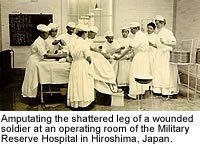American Angels of Mercy: Dr. Anita Newcomb McGee's Pictorial Record of the Russo-Japanese War, 1904
The Russo-Japanese War, 1904-1905
The Russo-Japanese War was a clash between two expanding empires. In some ways it was a very twentieth-century war, with large armies using automatic weapons; in other ways it reflected the values of the nineteenth century, with Russian citizens donating money to the Japanese Red Cross in appreciation for the care of their soldiers. Both Japan and Russia desired to enlarge their power and influence in countries that China had controlled. Previously, Japan had defeated China in the Sino-Japanese War of 1894. The Treaty of Shimonoseki ending this war gave Korea nominal independence, although Japanese settled there and controlled the railroad. Japan received Port Arthur (Lüshun) and the entire Liaodong peninsula, and thus could control the Yellow Sea. International pressure, including Russian, forced Japan to return China's territory. In 1898, Russia leased the peninsula and the ice-free harbor at Port Arthur from the Chinese. Russia built a naval base at Port Arthur and a commercial port at Dalny (Darien). On February 8, 1904, Japan launched a surprise naval attack on Port Arthur. Japan bottled the Russian fleet in the harbor, but failed to take the port. In March, Japan's First Army occupied Korea, landing at Chemulpo (Inchon) and Nampo, and driving north for the Yalu River. In May, Japan landed more armies on the Liaodong peninsula and pushed northward, cutting off Port Arthur from reinforcements. Russia lost battles at Fuhsien and Liaoyang in the summer, but began receiving troops over the Trans-Siberian Railroad and counterattacked in the fall. Japan was becoming over-extended, yet on Jan. 2, 1905 the commander of Port Arthur surrendered.
From late February through early March, the two forces committed over one-half million men at the battle of Mukden with both suffering heavy casualties. Russia lost almost 90,000 men and the Japanese over 50,000 and perhaps up to 70,000. Mukden, the last major land battle of the war, was followed by the decisive naval Battle of Tsushima in May 1905. The Russian Baltic Fleet was attempting to reach Vladivostok in Siberia when the Japanese destroyed it. By then both sides were facing internal difficulties, financial in Japan and political in Russia, and agreed to peace negotiations led by President Theodore Roosevelt. The Treaty of Portsmouth (New Hampshire) required Russia to remove its troops from Manchuria while permitting the Japanese to hold the Liaodong peninsula and Korea. As a result of public outcry over Russian concessions in the treaty, the Czar was forced to liberalize his government, while Japan's successful military gained increasing political power.




